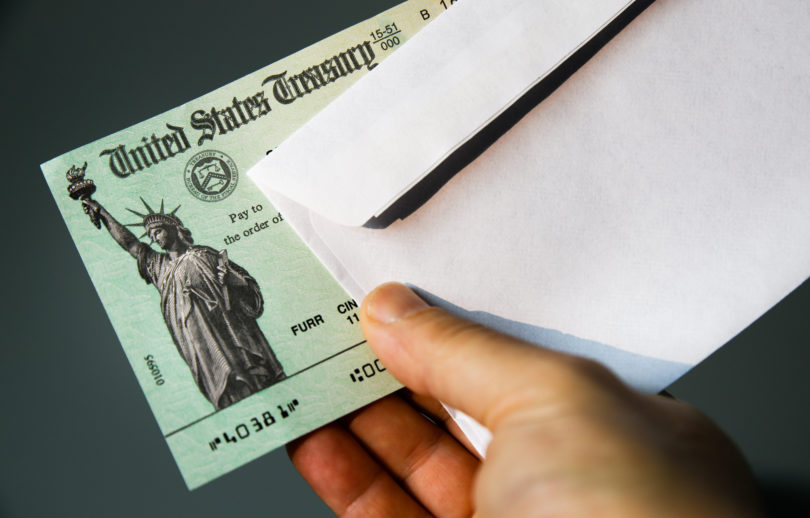Over 100 million Americans have received their stimulus money so far and many millions more due to receive them over the coming weeks and months. But, some people found that their stimulus money was of a lower amount than they were expecting. According to the IRS, here are the reasons that could be and what you can do about it.
Is Your Stimulus Payout Lower Than Thought? Here Is Why That May Be
First, How Much to Expect?
There is a great calculator below that can quickly give you an amount that you should be able to expect from your stimulus payout.
This calculator was developed by Maciej Kowalski, PhD candidate and Jasmine J Mah and available at Omni Calculator
Reasons Your Stimulus Payment Could Be Lower Than You Thought
Your 2019 Return Has Not Been Filed or Not Processed
If you are required to file a tax return, the stimulus amount was to be based on your 2018 return or 2019 return, whichever was most recently filed.
The problem is that many 2019 returns have not yet been processed due to the IRS slowdown in light of COVID-19. This means that even if you filed your 2019 return, your stimulus money will be based on your 2018 return.
If you made more money in 2018 than 2019 (or you had an addition of a child to your family in 2019), your actual stimulus amount will be lower than you had thought since the stimulus payout was based on 2018. See below about what to do about this.
Claimed Dependents Are Not Eligible for the $500 Payment
Under the stimulus package, you can receive a $500 payment for each child under the age of 17. But, how the bill was put together causes there to be some issues with these dependents, as you will see in the next couple of points.
For this first one, here is how the IRS classifies a child dependent for the purpose of this stimulus money:
The taxpayer generally must be related to the child, live with them more than half the year and provide at least half of their support. Besides their own children, adopted children and foster children, eligible children can include the taxpayer’s younger siblings, grandchildren, nieces and nephews if they can be claimed as dependents. In addition, any qualifying child must be a U.S. citizen, permanent resident or other qualifying resident alien. The child must also be under the age of 17 at the end of the year for the tax return on which the IRS bases the payment determination.
A qualifying child must have a valid Social Security number (SSN) or an Adoption Taxpayer Identification Number (ATIN). A child with an Individual Taxpayer Identification Number (ITIN) is not eligible for an additional payment.
So, if your claimed dependent of a child does not meet the above criteria, that could likely be why your amount is lower – it does not include the $500 per child that does not meet the above criteria.
Finally, if you are separated from the child’s parent, whichever parent has claimed the child will be the one that receives the $500 amount for that child (if there was not a joint return filed).
Dependents Are College Students
Again, here is an area where the stimulus bill left many people out in the cold in regards to receiving money. If your claimed dependent/child is 17 years of age or older, you will not be able to receive the $500 amount for that child.
Furthermore, since you had claimed that child on your return, that child will also not be eligible to receive the $1,200 as an adult. But, if the college student was not claimed by anyone, they can receive the $1,200 amount on their 2020 return.
Keep in mind this point as well – this information is all based on the most recent tax return processed, either 2018 or 2019. If your 2019 has not been processed yet but you had your college-aged child as a claimed dependent on the 2018 return, neither of you will receive the money from that child since he or she was claimed on the most recent return processed.
Claimed Dependents Are Parents or Relatives
Back to the age gap again – to put it simply, if your claimed dependent is 17 or older, you will not be able to receive the $500 payment for that person.
If that claimed dependent is a parent or other relative, they will also not be eligible to receive the $1,200 on their own since you had claimed them in your tax return.
If you were not claimed as a dependent, you can file on your 2020 return for your own $1,200 stimulus amount if you didn’t receive it this year.
Past-Due Child Support
If you are past due in your child support payments, that past due amount will be deducted from the stimulus amount. The good thing is that you will receive a letter specifically addressing this issue so you will know what has happened and not be wondering why the amount is off.
Also, it seems there were some errors in the system when it came to married taxpayers who filed jointly with an injured spouse claim. In some cases, the spouse who made the injured spouse claim found their portion of the stimulus money to be offset if the other spouse had been past due on child support payments. The IRS says this will be addressed automatically and you won’t have to do anything about it.
Garnishment by Creditors
While there had been some talk about a tag being put on the direct deposit amounts to prevent creditors from taking the money, this did not happen. So, if you found your direct deposit amount to be less than you thought, it could have been garnished by creditors you may have. This would only happen once the money is in your bank account – so if you receive a check, it would only happen upon deposit.
What Can You Do If the Amount is Wrong?
So, if you received an amount different from what you had expected, what can you do? First of all, make sure it is not because of something from above like the dependent part.
Next, you can file for it on your 2020 tax return, especially if it is in regards to your 2018 return being used as the basis for this because your 2019 return had not been processed.
Technically, the IRS says that the stimulus money was simply an advance on your next year return so filing for part of the stimulus money that was missing and owed to you can be done on your 2020 return. While that will not help you right now, it will give you a little something extra next year.
This can also be the case for children. For example, our 2019 return is still in process so we did not get the money for a child that was born last year. We can claim that credit on our 2020 return.
The IRS has said they will be putting out instructions for this when the time gets closer for 2020 tax filings.
Did these help answer any of the reasons for why you didn’t get what you thought? If not, leave a comment and maybe someone can help or is in a similar situation!
Here are some other articles about the stimulus payout:
- Waiting for the Stimulus? The IRS Has Made a “Significant” Upgrade to the Tool
- Stimulus Money for SSI Recipients: What You Need to Know
- What Happens if You Didn’t Get Your Stimulus Money Yet?
- Here is When You Will Get Your Stimulus Check
- Stimulus Money Problems? Here is Why You May Not Have Received Your Money
- Is the IRS “Get My Payment” Tool Not Working? This May Help








Okay I am senior who is 61 with no money and retired tying to get m ssd IAM on hold no income wat should I do I need help